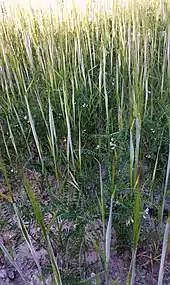كرسنة
Arabic

كِرْسَنَّة
Etymology
From Aramaic כַּרְשִׁינָא (karšinnā) or Hebrew כַּרְשִׁינָה (karšīna). That is explained as from Sanskrit कृष्ण (kṛṣṇa, “black”) and so this is a doublet of كُشْنَى (kušnā, “Vicia palaestina”), which comes via Classical Syriac ܟܘܫܢܐ (kūšnā), also in Akkadian 𒄘𒃻𒄯𒊏 (/kiššanu/), or instead as from Classical Syriac ܟܱܪܣܴܢܳܐ (karsānā, karsannā, “ventrose”) (to Proto-Semitic *kariś- (“paunch”)) because of flatulence of the belly one has when eating from this plant.
Akin to Old Armenian քրսամն (kʻrsamn), Armenian քուռուշնա (kʻuṙušna), Azerbaijani kürüşnə, kürişnə.
Noun
كَرْسَنَّة or كِرْسَنَّة or كِرْسِنَّة or كِرْسَنَة or كَرْسَنَة • (karsanna or kirsanna or kirsinna or kirsana or karsana) f
Declension
Declension of noun كَرْسَنَّة (karsanna); كِرْسَنَّة (kirsanna); كِرْسِنَّة (kirsinna); كِرْسَنَة (kirsana); كَرْسَنَة (karsana)
| Singular | singular triptote in ـَة (-a) | ||
|---|---|---|---|
| Indefinite | Definite | Construct | |
| Informal | كَرْسَنَّة; كِرْسَنَّة; كِرْسِنَّة; كِرْسَنَة; كَرْسَنَة karsanna; kirsanna; kirsinna; kirsana; karsana |
الْكَرْسَنَّة; الْكِرْسَنَّة; الْكِرْسِنَّة; الْكِرْسَنَة; الْكَرْسَنَة al-karsanna; al-kirsanna; al-kirsinna; al-kirsana; al-karsana |
كَرْسَنَّة; كِرْسَنَّة; كِرْسِنَّة; كِرْسَنَة; كَرْسَنَة karsannat; kirsannat; kirsinnat; kirsanat; karsanat |
| Nominative | كَرْسَنَّةٌ; كِرْسَنَّةٌ; كِرْسِنَّةٌ; كِرْسَنَةٌ; كَرْسَنَةٌ karsannatun; kirsannatun; kirsinnatun; kirsanatun; karsanatun |
الْكَرْسَنَّةُ; الْكِرْسَنَّةُ; الْكِرْسِنَّةُ; الْكِرْسَنَةُ; الْكَرْسَنَةُ al-karsannatu; al-kirsannatu; al-kirsinnatu; al-kirsanatu; al-karsanatu |
كَرْسَنَّةُ; كِرْسَنَّةُ; كِرْسِنَّةُ; كِرْسَنَةُ; كَرْسَنَةُ karsannatu; kirsannatu; kirsinnatu; kirsanatu; karsanatu |
| Accusative | كَرْسَنَّةً; كِرْسَنَّةً; كِرْسِنَّةً; كِرْسَنَةً; كَرْسَنَةً karsannatan; kirsannatan; kirsinnatan; kirsanatan; karsanatan |
الْكَرْسَنَّةَ; الْكِرْسَنَّةَ; الْكِرْسِنَّةَ; الْكِرْسَنَةَ; الْكَرْسَنَةَ al-karsannata; al-kirsannata; al-kirsinnata; al-kirsanata; al-karsanata |
كَرْسَنَّةَ; كِرْسَنَّةَ; كِرْسِنَّةَ; كِرْسَنَةَ; كَرْسَنَةَ karsannata; kirsannata; kirsinnata; kirsanata; karsanata |
| Genitive | كَرْسَنَّةٍ; كِرْسَنَّةٍ; كِرْسِنَّةٍ; كِرْسَنَةٍ; كَرْسَنَةٍ karsannatin; kirsannatin; kirsinnatin; kirsanatin; karsanatin |
الْكَرْسَنَّةِ; الْكِرْسَنَّةِ; الْكِرْسِنَّةِ; الْكِرْسَنَةِ; الْكَرْسَنَةِ al-karsannati; al-kirsannati; al-kirsinnati; al-kirsanati; al-karsanati |
كَرْسَنَّةِ; كِرْسَنَّةِ; كِرْسِنَّةِ; كِرْسَنَةِ; كَرْسَنَةِ karsannati; kirsannati; kirsinnati; kirsanati; karsanati |
References
- Corriente, Federico, Pereira, Christophe, Vicente, Angeles, editors (2017), Dictionnaire du faisceau dialectal arabe andalou. Perspectives phraséologiques et étymologiques (in French), Berlin: De Gruyter, →ISBN, page 1099
- Dozy, Reinhart Pieter Anne (1881) “كرسنة”, in Supplément aux dictionnaires arabes (in French), volume 2, Leiden: E. J. Brill, page 456
- Levey, Martin (1973) Early Arabic Pharmacology. An Introduction Based on Ancient and Medieval Sources, Leiden: Brill, page 59
- Löw, Immanuel (1916) “Erwe und Wicke”, in Zeitschrift für Assyriologie und verwandte Gebiete (in German), volume 30, pages 171–183, especially page 175 where a letter of Theodor Nöldeke from the 13th of Dec. 1914 is quoted about the etymology.
This article is issued from Wiktionary. The text is licensed under Creative Commons - Attribution - Sharealike. Additional terms may apply for the media files.